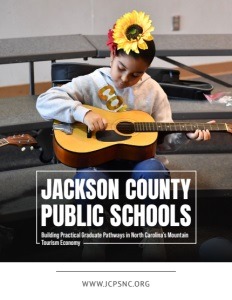Building Practical Graduate Pathways in North Carolina’s Mountain Tourism Economy
A Rural District Beneath the Great Smoky Mountains Prepares Students for Careers That Sustain Their Community.
Jackson County Public Schools, located in the mountains of western North Carolina, just 20 miles from the Great Smoky Mountains National Park, serves 3317 students across nine schools in one of the most scenic yet economically challenging regions of the state. With 49.2% of students qualifying for free or reduced lunch and tourism driving much of the local economy, the district has crafted an educational philosophy that recognizes a fundamental truth: not every graduate is destined for a four-year university.
“Our goal for every student is to be a graduate and walk out and have three options,” says Dana Ayers, who is beginning her fifth year as superintendent. “That’s being enrolled, enlisted, or employed.” The framework aligns with North Carolina’s statewide educational goals. In a county where the Eastern Band of Cherokee Indians maintains a portion of its Qualla Boundary reservation and where visitor spending reached $468 million in 2023, the district actively prepares students for careers that sustain the regional economy, healthcare to hospitality, from entrepreneurship to skilled trades.
A Tiered Mental Health Approach to Supporting the Whole Student
The mental health infrastructure at Jackson County Public Schools operates on a tiered model that reaches every student in the district. “We recognize that a student’s academic success is not a silo,” Ayers explains. “All those other things have to be part of what makes them successful.” At the foundation, all students receive character education delivered by classroom teachers, focusing on skills that build good citizenship and positive peer relationships. For students needing additional support, the district employs more counselors and social workers than the standard North Carolina allotment, a direct response to advocacy from students themselves several years ago.
“Our students spoke out and said, this is what we need,” explains Angela Dills, Assistant Superintendent for Curriculum and Instruction. “Our community, school board, and county commissioners listened and provided some extra support.” The county’s willingness to fund positions beyond state requirements reflects Jackson County’s history of educational investment, dating back to when it implemented a one-to-one device program, years before the pandemic made such technology essential.
The most advanced tier addresses students facing more severe challenges. Through the Project AWARE grant secured before Ayers arrived, the district employs certified therapists and mental health clinicians who provide intensive counseling services. “We have the ability to connect to mental health supports when a student is experiencing homelessness, suicidal ideation or just struggling to get into the group,” Ayers says. Students can request services confidentially, without drawing attention, and clinicians connect families with additional community resources when needed. The tiered system ensures no student falls through gaps between universal support and crisis intervention. This structure recognizes mental wellness as a prerequisite to academic achievement in a region where economic pressures and geographic isolation compound typical adolescent challenges.
Building on Technology, From Early Innovation to Modern STEM
Long before the pandemic forced school districts nationwide to scramble for devices and internet connectivity, Jackson County Public Schools had already solved those problems. The district laid fiber optic cable to all its schools more than 20 years ago and secured T1 connections when most institutions had never heard of them. The infrastructure proved so robust that Western Carolina University and Southwestern Community College asked to connect to the school system’s network, reversing the typical relationship between higher education and K-12 institutions.
“We were the first district west of Buncombe County to go true one-to-one with high school, middle school, and even our elementary school kids, well before COVID,” says Jacob Buchanan, Deputy Superintendent. “This was totally funded as an initiative from our community.” Every classroom received smart boards or Promethean panels, and every student gained access to a device. The investment came entirely from local tax dollars and a Golden Leaf grant, revealing a level of community support uncommon in rural districts where property tax bases typically limit capital expenditures.
That foundation now supports advanced programming that distinguishes the district statewide. At Blue Ridge Early College, students can earn an FAA 107 drone license through a second-level course in drone technology. “I think there are nine school systems in North Carolina right now that are offering that credential going into this year,” Dills notes. The comprehensive high school Smoky Mountain High School, runs a First Robotics team that has competed for years, while media coordinators at every school provide STEM content ranging from 3D printing to robotics clubs. The district has also integrated artificial intelligence into the curriculum. “We know our students are using AI, and our objective is to teach them how to use it appropriately because they will likely encounter it in the workplace and beyond,” Dills says.

Career Pathways That Connect to Community Needs
With over 50 career and technical education courses available across the district, Jackson County Public Schools offers a breadth of programming remarkable for its size. The offerings stem from a custom-built career development plan that every student completes, a system the district designed through Google Classroom rather than purchasing an off-the-shelf product. The approach allows staff to track student interests and passions, then advise them toward aligned career pathways and relevant coursework.
“My thing is if we can find what keeps kids coming to school every single day, whether that’s health science or if that is carpentry or if it’s business, how do we connect those interests for kids to make that learning meaningful and relevant?” Dills asks. The question drives course selection across the district, where students can pursue credentials in certified nursing assistant to pharmacy technician. North Carolina funds these industry credentials, allowing students to graduate with certifications that open immediate employment opportunities or stack toward post-secondary education.
Healthcare programming has expanded in response to regional workforce shortages. The district now employs three health science teachers who prepare approximately 30 certified nursing assistants and between 15 and 20 pharmacy technicians annually. Dills serves on a MAHEC committee out of Asheville that identifies healthcare needs across western North Carolina, ensuring the district’s programs align with employer demands. Harris Regional Hospital, an 86-bed facility affiliated with Duke LifePoint, partners with the district to host clinical rotations and internships in both hospital and long-term care settings.
Early childhood education addresses another critical gap. The district created a pre-apprenticeship program that placed three high school students in preschool classrooms last year. “We’re growing our own so that we’re contributing to that workforce,” Dills explains, describing students who intern in the district’s preschool programs while earning credentials that prepare them for immediate employment or further education.
Partnerships, Entrepreneurship, and Real-World Experience
Geography shapes opportunity in Jackson County, where tourism generates the largest employment sector and the rural setting limits traditional internship placements for students under 18. The district has responded by building partnerships that give students exposure to local businesses while developing entrepreneurial skills that consider the community’s economic foundation. Small businesses drive the regional economy, and the district has made entrepreneurship a cornerstone of its career preparation.
At Smoky Mountain High School, students run Smoky Mountain Espresso, a coffee shop that serves faculty while teaching the full cycle of business operations. “Students can take the culinary expertise that they’ve learned in our courses, and they run a coffee shop,” Dills says. “It shows the students how you come full circle in the delivery of the culinary skills, but how we match that with the business skills of marketing, selling, promotion, stocking, all of those kinds of different things.”
A career development coordinator serves the entire district, connecting students with part-time work and summer employment opportunities as they arise. Businesses frequently approach the district seeking employees, particularly in tourism-related positions that fuel the $468 million visitor economy. While formal internships face age restrictions, the district arranges shadowing experiences that allow students to test career interests. Ayers describes one early college student who spent a semester in a law office and realized she wanted to pursue a different path. “I always call it dipping our toe,” she says. “We’re giving our kids a chance to dip their toes into something and they can determine if that’s something that they want to pursue.”
Capital Investment in the Middle School of Tomorrow
Jackson County Public Schools operate with a structure uncommon in North Carolina: elementary schools that house students from preschool through eighth grade, with no traditional middle school. Students typically spend nine or ten years in the same building before transitioning to high school. That model is about to change dramatically, thanks to a $52 million needs-based grant from the North Carolina Department of Public Instruction awarded nearly a year ago.

“We wrote a grant,” Ayers explains. “It probably is not going to complete the project, but what that means is we already have hired an architect. We’re in the planning and design phase of that.” Within three to four years, the district will pull grades six, seven, and eight into a dedicated middle school facility. “The move will allow staff to focus specifically on adolescent development and expand career and technical education offerings at the middle level, introducing younger students to pathways before they reach high school.”
The middle school project leads a broader capital improvement initiative funded by the Jackson County Board of Commissioners. Four additional projects are in planning stages: a new cafeteria at Fairview Elementary School, a gymnasium at Blue Ridge Early College, a track facility at Smoky Mountain High School, expanded classroom space at Blue Ridge School, and a replacement for the bus garage built in the early 1960s. “Our bus garage is our second oldest building in the district,” Buchanan notes.
The capital investments come from decades of community support. Jackson County’s population grew 22% over the past decade, straining existing facilities. “It’s been a long time coming and they know that they can fund these projects,” Ayers says of the commissioners. “Jackson County Public Schools should be set and ready capital-wise for the next 20 years.”
A Vision for Community-Centered Excellence
Academic success remains the district’s primary focus, with staff constantly analyzing test data required by state assessments. However, preparing strong readers and academically capable students represents only part of the district’s mission. “We want to make sure that we’re preparing students that when they walk out of school, they are really good readers, strong readers,” Ayers says.

The district recently launched a JROTC program that attracted significant student interest. While not all participants will pursue military careers, the program offers leadership development that serves students regardless of their post-graduation plans.
The district’s vision isn’t just about preparing students for external opportunities. “We want to prepare students to be successful in high school and then be able to go out into the world and make a name for themselves,” Ayers says. “That name could be you’re the best plumber in Jackson County, or you might be the next doctor that is coming from Duke Hospital or the next farmer.” The approach requires ongoing dialogue with businesses about workforce needs and constant evaluation of program offerings. Collaboration with community partners ensures graduates can contribute to the local economy.
In a county where tourism draws millions to mountain vistas and where Western Carolina University’s 10,000 students nearly match the population of neighboring Cullowhee, Jackson County Public Schools has built an educational model that serves its place. The focus remains preparing every student for enrollment, enlistment, or employment while giving back to a community that continues to invest in its schools and its future.
AT A GLANCE
Who: Jackson County Public Schools
What: Public school district serving 3317 students across nine schools in western North Carolina, offering 50+ career and technical education courses, tiered mental health services, and early college programs
Where: Sylva, North Carolina
Website: www.jcpsnc.org
PREFERRED VENDORS/PARTNERS
Mark III Employee Benefits: www.markiiieb.com
As one of North Carolina’s few remaining independent brokerages, Mark III has been family-owned and locally operated since 1973. Focused on North Carolina’s K–12 schools, we provide customized benefits for your employees, combining local knowledge with personalized service while maintaining a commitment to you, the local public servant.



